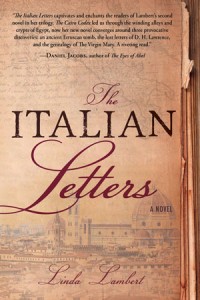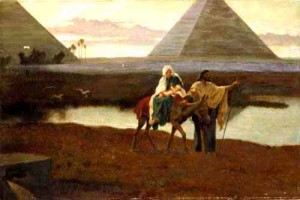history
Newer Entries »The Italian Letters released!
Thursday, October 2nd, 2014
The sequel to the award-winning The Cairo Codex, The Italian Letters, has just been released! You may order it now at your local bookstore. Or at Amazon.
The Italian Letters lies in the sensuous curvature of ancient, 20th and 21st century Italy. The sequel to The Cairo Codex follows the adventures of anthropologist Justine Jenner after she is expelled from Egypt in the wake of discovering the diary of the Virgin Mary. Exiled into Tuscany, Justine finds herself embroiled in three interwoven stories of discovery: the long-lost letters of D. H. Lawrence to her great grandmother, Isabella; an ancient tomb revealed the origin and migration of an ancient people pre-dating Rome; and the genealogy of the Virgin Mary and Jesus. While shaken by the frank revelations in Lawrence’s letters and the intimate relationship between the primeval Etruscan’s and Jesus’ mother, Justine must confront her own sexuality and yearning for personal freedom. The second in a trilogy, The Italian Letters is riveted with literary, religious, and archeological history and international politics, each narrative magnifying and altering the meaning of the others.
The Italian Letters is the suspense edition of Etruscan Evenings.
Tags: D.H. Lawrence, Etruscans, Fiesole, Rome, suspense
Posted in Book Tour, Fiction, history, imagination, Italy, shifting genres, trilogy, writing | No Comments » | Leave a Comment
Pre-order The Italian Letters!
Friday, September 19th, 2014
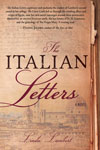
The Italian Letters by Linda Lambert
At your local bookstore or Amazon.
Release date: October 14, 2014.
The Italian Letters is the second in the Justine Trilogy.
Tags: Book Clubs, Etruscans, fiction, imagination, trilogy, writing
Posted in Fiction, history, Italy, Travel, trilogy, writing | No Comments » | Leave a Comment
The Italian Letters- Chapter 4
Thursday, August 21st, 2014
Chapter 1-3 of The Italian Letters are attached to The Cairo Codex e-book now on sale
from Amazon. Here is Chapter 4:
The Italian Letters
“Unrequited love is the only possible way to give yourself
to another without being held in indentured servitude.”
-Bauvard, Some Inspiration for the Overenthusiastic
Her head still spinning from the museum visit, Justine parked her Spider in front of Chez Anna and checked in. She climbed the stairs to her room, threw open the shutters, and gazed out on the valley below, the sea beyond. Her mind floated back to the carved mirror in the ceiling of the tomb, the married couple in a warm, respectful relationship on the sarcophagus lid in the museum. Riveting images of men and women together . . . what did she know now?
The iron four-poster bed, covered with a white quilted coverlet, coaxed her to take off her shoes and dirt-encrusted khakis and relax with her latest purchase—D.H. Lawrence’s Virgin and the Gypsy, a quick read that the author had written for his stepdaughter, Barbara. She was again surprised by Lawrence’s ability to write with such sensuality without explicitly describing sexual consummation (until Lady Chatterley, that is):
[[Q]]
. . . And through his body, wrapped round her strange and lithe and powerful, like tentacles, rippled with shuddering as an electric current, still the rigid tension of the muscles that held her clenched steadied them both, and gradually the sickening violence of the shuddering, caused by shock, abated, in his body first, then in hers, and the warmth revived between them. And as it roused, their tortured semi-conscious minds became unconscious, they passed away into sleep.
[[/Q]]
An hour later, Justine was awakened by a cool air drifting in from the sea. Stretching and shivering, she took a warm shower and dressed in a white silk blouse and clean khaki slacks. She was ready for dinner with her father.
###
It was a short walk back down a narrow street, hugged by fourteenth-century stone houses, to the fish restaurant Morgan had suggested. The theatrical owner and chef came from Napoli, and therefore was immediately held suspect by locals. The Ristorante Vladimiro ai Bastioni boasted the best Napolitano seafood outside of Rome . . . and Napoli, of course. Two diners at the table in the intimate room. One was her apprehensive father.
“Good evening, Dad,” she said in a lighthearted tone. “I see you’ve started on our bottle of wine.”
The other man turned toward her. She gasped. “Oh . . . Amir! What a surprise! I didn’t know you were here.” Her voice sounded slightly accusatory.
Morgan looked puzzled.
Amir met Justine’s questioning stare. “Do you think I’m following you?”
Justine blushed. “It entered my mind.”
“Whoa! Hold on here!” Morgan nearly shouted. “If I’d thought there was something between you two, I’d never have hired Amir without talking with you, Justine.”
“There is nothing between us.” Justine’s voice was confident.
Amir looked wounded. He turned toward the mustard stucco walls, dotted with framed photos and commendations to the owner as a much younger man. “Quite an array of accomplishments,” he noted, and picked up his wine. “Your father’s offering me a job. Archaeologist on the new dig.”
Morgan glanced at each of his guests, one at a time. He squinted. “You do know that I’ve known this young man since he was a mere whippersnapper.”
“Of course, Dad. I was just caught off guard.”
“Now for the wine. A little celebration,” Morgan said. “Mastroberardino Lacryma Christi del Vesuvio Bianco, tears of the Christ. I thought it apropos. Made from the Coda di Volpe, tail of the fox, to be exact.” He poured them each a glass. “Did you get some rest?” he asked, cautious with his daughter.
“I couldn’t rest until I went to the museum. Remarkable!”
“How so?” asked Amir.
“I visited it on my first day in town,” Morgan interrupted. “Impressive structure, but not much of a museum. At least, it doesn’t live up to the reputation of the necropolis itself.” He sipped his wine, watching them closely over the rim of his glass.
“You asked why I found it remarkable, Amir,” she said, ignoring her father. “I found it not only informative but moving. Particularly the Sarcophagus of the Married Couple. There seemed to be such an equal, respectful relationship among Etruscan men and women.” Picking up her wine glass, she held it suspended in her right hand until she concluded her impassioned description, then she took her first sip.
Amir nodded, captivated by her passion.
“You read too much into things, honey,” said Morgan. A flicker of regret moved through his eyes.
“Perhaps you’re right.” Her comment surprised both of them. Morgan relaxed into a familiar grin. He didn’t anticipate what was coming.
“Women are gifted with intuitive powers denied to men. Perhaps men are just defective women.” She saluted the two men with her glass, winked, and suggested that they order.
Amir laughed wholly, a laugh that Justine loved, and looked around for the menu.
“So true, Justine. So true.” Morgan also laughed with unrestrained fullness. “We don’t order here. Giuseppe tells us what we want to eat.” He motioned to the owner, who walked toward the table, his majestic stride practiced for a more abundant audience. “What delightful dishes do you have for us tonight, my friend?” Morgan had become a regular patron, one who was treated with the reverence of family.
“Calamari Ripieni and Pescespado o Tonno Alla Stemperata, signore. Giuseppe’s best. Only for you.” He clustered his chubby fingers into a bud and pressed them to his pursed lips. His smile stretched from cheek to cheek.
“Squid and tuna?” Justine asked, turning toward her father.
“Tonight, no tuna. Swordfish, my lovely signorina. Calamari stuffed with pecorino and prosciutto,” Giuseppe said in his rich Genoan accent. “And who is this beauty with you tonight, signore?”
“Ah, forgive me. Meet my daughter, Justine.” Giuseppe bowed deeply and kissed Justine’s hand. His gallantry charmed her. “And, this young man is my colleague, Amir El Shabry.”
Amir smiled and bowed slightly.
“Everything sounds wonderful,” Justine assured him, flashing her most beguiling smile.
The chef came to stand next to Giuseppe. “My friend here prepares the swordfish with olives and raisins and capers. Delicious,” said her father. The rotund chef hurried back to his open kitchen.
Two hours later, compliments about the glorious seafood paid, the three of them exhausted from speculating about the work to come in Cerveteri, the evening was winding down. With the second bottle of wine, tensions had relaxed and the three had become playful, recalling the years Morgan had taken Lucrezia and Justine with him on dig assignments in Egypt. Amir had tagged along, fascinated by Justine’s buoyant crinoline skirts, at children’s parties at his family home in Cairo. Morgan’s partner and mentor, Amir’s grandfather, Ibrahim El Shabry, had brought the families together on festive occasions. Being Egyptian, Lucrezia had forever been the guide and the star of any occasion.
Justine watched Amir closely as he picked at his dinner. Both Justine and her father knew that Egyptians tended to shy away from exotic cuisine. She had almost forgotten how handsome he was with his rumpled, curly black hair and piercing dark eyes. So sensual, so sexy.
“I’ll walk you back to Anna’s. That’s where you’re staying—right?” asked Amir.
“Thank you, Amir. Dad—you coming?”
“I’ll nurse my brandy.” Morgan pointed to the owner. “Giuseppe and I have some lies to exchange.”
###
“Why did you say there was nothing between us?” Amir asked as they turned the corner and started west down the narrow, darkened street. “We’ve been through a lot together. How about the kidnapping? Finding the Virgin Mary’s comb? My brother’s death?”
Justine shivered. He was right. They had been through a great deal together. Perhaps she didn’t want her father to know how intertwined they really were. They had desired one another, but refused to act on those feelings. Besides, she knew she wasn’t entirely over her affair with her betraying Egyptian lover, Nasser. Her father had been pressuring her on the details. “I know, you’re right, Amir. I’m sorry. But why didn’t you tell me you were coming? Going to be working with Dad? You have my e-mail.”
Amir took a deep breath. They had arrived in front of Anna’s. “I’d like to come up for a few minutes. At least try to resolve some misconceptions.”
Justine let the comment pass. She opened the outside door with her key and started up the stairs. Amir followed. The door to her room was unlocked. Inside, she turned to face him. “So, what’s the story here?”
“I assumed your father would tell you—and, frankly, as you said at dinner, I feared you’d think I was following you.”
“Were you?” she challenged.
“Justine, you know I’ve wanted to get back into the field for a long time . . . but there is some truth in your hunch. I did want to be nearer to you.” He stepped closer, moonlight catching the side of her face, her white blouse.
“So you relied upon my father to be the intermediary? To inform me of your intentions?” Her voice rose, eyes flashing. She reached over and turned on the table lamp. “I think you know I don’t like being treated like a little girl, especially when my father is concerned. Please don’t communicate with me through him.”
Amir looked confused, miserable, angry. “Why are you overreacting like this? I thought you’d be glad to see me!” He grabbed her by the shoulders. Their fiery eyes met, and held. Her body stiffened—then, breathing deeply, relaxed.
She let her head drop onto his chest. He softened his grip, wrapped his arms around her, holding her, and both began weeping, exhausted by the old desire that now seized them. They began breathing together, the near panting that marked longing. Finally, he raised her chin to meet his and kissed her tenderly, the embrace long, delicious, leading to hunger, then to demand. Shivering, she pushed him back, enveloping him with her eyes. He was handsome, sensual beyond belief. Slowly she began to unbutton her blouse.
He took her in his arms, spun her back toward the bed and let them both fall, press into her quilt. He kissed her with near desperation, born of unrequited obsession.
She held him tightly as they embraced, her legs wrapped around him now, and rolled on the bed. They slowed as they flourished in each other’s bodies, exploring with touch, caressing, finding the heat of buried passion. Shadows danced across the walls, then stilled. No words were spoken before they fell into a deep sleep.
Tags: Italy, Justine Trilogy, The Italian Letters
Posted in Amazon sale, Fiction, history, Italy, trilogy, writing | No Comments » | Leave a Comment
“The Art of Setting the Senses on Edge”
Sunday, June 8th, 2014
That’s how Anthony Tommasini titled his excellent column on music and dissonance (NYT, June 1, 14). In reference to Milton’s use of “barbaric dissonance,” the author waded–no–jumped right into the many understandings of dissonance from politics, to music, to psychology. I had been the most familiar with cognitive dissonance as that state of internal tension arising from contradictions, confusions, that we must make right. Those eternal puzzles that cause our heads to spin. Problems that leap at us during the night and steal our sleep away.
Well, Tommasini’s discussion of the clashing, barbarous, discordant sounds in music are not unlike those tight-wire puzzles in novels. Such cases of dissonance indeed set “the senses on edge.” Here are a few cases that occur to me at the moment when the author:
1) dangles a subtle unknown before the reader with just a brush of puzzlement. What could this mean? Lead to?
2) two barbarous acts confront the reader, yet the narrator isn’t aware of the contradiction. You want to cry out–look, can’t you see!
3) a fine mesh of small descriptors about a character hints at impending transformation–or disaster! We don’t know which.
4) a directly-declared, barbaric crime (Sherlock-style), yet you know that there will be nothing direct or obvious about the resolution. Arthur Conan Doyle makes sure of that.
Next up: Norman Mailer’s hunt to find a narrator “more intelligent than he was.”
Linda
Tags: Anthony Tommasini, Arthur Conan Doyle, music
Posted in creativity, Fiction, history, imagination, non-fiction, writing | No Comments » | Leave a Comment
The Cairo Codex wins 3 awards
Wednesday, May 7th, 2014
The Cairo Codex, has now won three prestigious 2014 awards: the Silver Nautilus Award for fiction, the Bronze International Independent Publishers Award for historical fiction, and was a finalist in the USA Best Books Award competition. The Cairo Codex, a riveting novel of suspense, politics, religion, and romance is set in Egypt during the years 2 and 2007. Anthropologist Justine Jenner discovers the diary of Mary of Nazareth, the mother of Jesus, in an ancient crypt during a major earthquake. She barely survives with the codex and her life, both threatened by the Muslim Brotherhood.
I became enthralled with Egypt as a young girl when my mother enchanted me with tales of her own alleged reincarnation from Egyptian royalty. In 1989, I became a State Department Envoy to Egypt and began two decades of exploration of its culture. I’ve written several internationally-recognized books in the field of leadership, none as fun as fiction! Before fiction, I was an administrator, history instructor, international consultant, and am professor emeritus at California State University, East Bay.
The second novel in The Justine Trilogy, The Italian Letters, will be released this fall (I know, I know, I said July!) and the third novel, A Rapture of Ravens, in early 2015.
Tags: awards, codex, Egypt, fiction, Jesus, literary, Muslim, politics, trilogy, Virgin Mary, writing
Posted in creativity, Education, Egypt, Fiction, history, imagination, Leadership, Nautilus Award, trilogy, writing | No Comments » | Leave a Comment
The Nautilus Award–What is it? Why Nautilus?
Sunday, April 27th, 2014
This week our grandson, Jered, was quick to suggest the origin of the Nautilus Award. Of course, I realized. Jules Verne’s Twenty Thousand Leagues Under the Sea tells the story of Captain Nemo and his submarine, the Nautilus. Verne is revered for his imagination, innovation, creativity.
My historical novel, The Cairo Codex, won a 2014 Silver Nautilus Award for Fiction. The awards will be announced on May 1. The awards represent “Better Books for a Better World.” Now in its 15th year, this unique book award program seeks, honors, awards, and promotes print books that inspire and connect our lives as individuals, communities and global citizens. Dedicated to excellence and the highest literary standards, the Nautilus Awards seek and promote well-written and -produced books with messages about caring for, understanding, and improving every aspect of our lives and relationships.
I’m proud to be a member of the Nautilus family!
Tags: fiction, novel
Posted in creativity, Family, Fiction, history, imagination, Nautilus Award, writing | No Comments » | Leave a Comment
Coming Soon: the Second Book in the Justine Trilogy
Tuesday, March 11th, 2014
In August, 2013, The Cairo Codex, the first book in the Justine Trilogy, was released. In the beginning for this riveting trilogy, anthropologist Justine Jenner discovers a lost codex belonging to Mary, mother of Jesus. Readers particularly find and applaud the details describing Egypt and the build-up to the revolutions to be of compelling interest.
Now, I can forecast the publication of the second book in the Trilogy.
The Italian Letters lies in the sensuous curvature of ancient and present day Italy. The sequel to The Cairo Codex, follows the life of anthropologist Dr. Justine Jenner after she is expelled from Egypt in the wake of discovering and making public a controversial codex, the diary of the Virgin Mary. Exiled into Tuscany, Jenner finds herself embroiled in three interwoven stories of discovery: the long-lost letters from D.H. Lawrence to her great-grandmother, Isabella; an Etruscan tomb revealing the origin and migration of an ancient people predating Rome; and the genealogy of the Virgin Mary and Jesus. While shaken by the frank revelations in Lawrence’s letters and the intimate relationship between the primeval Etruscans and Jesus’ mother, Justine must confront her own sexuality and yearning for personal freedom. The Italian Letters is riveted with literary, religious and archeological history and international politics, each narrative magnifying and altering the meaning of the others.
Posted in creativity, Egypt, Fiction, history, Italy, Travel, trilogy, writing | No Comments » | Leave a Comment
Why a Trilogy?
Monday, December 16th, 2013
I am often asked: Why a Trilogy? Why not just write the first book and see how it goes? I’m sure my publisher has asked himself the same question. So I decided to answer this question as a set of “trilogy rules,” or—when you’re ready to write a trilogy.
You are on your way to a trilogy…
- You have a fierce obsession with some big themes, like the history of the Roman Empire, the transition of Egypt from a dictatorship to heaven knows what, the progression of a people or tribe, your characters must grow up and transform… You have a great deal to say and just can’t keep it under 400 pages.
- You have a lot to say about the evolution of an individual who is representative, iconic, symbolic of a particular group, e.g. women, a political or religious figure, men, ice skaters, explorers, etc.
- You are inventing/creating a voice and actions for a historical character, e.g. Mary of Nazareth, Jesus, Tolstoy, Hemingway, etc. Such a reinvention benefits from a trilogy since it takes time to alter the reader’s sensibilities and experiences.
- Novel Number 1 is doing so well that you receive fan letters demanding to see the next novel.
- Numbers 1-4 above are true for you, but you need a breathing space in between.
Linda
Tags: history, literary, novels, trilogy, women
Posted in Egypt, Fiction, history, Travel, trilogy | No Comments » | Leave a Comment
A Remarkable Holiday gift chronicles the Flight into Egypt
Monday, November 25th, 2013
Whether the object of your affection is Christian, Jewish, Muslim–or none of the above–The Cairo Codex is the perfect holiday gift. This riveting historical novel explores the world of Egypt in the year 2 and modern times. The codex discovered by anthropologist Justine Jenner is found to be the diary of Mary of Nazareth, mother of Jesus. The compelling first-person account sets forth the illuminating struggles and strengths of women through the ages and answers haunting questions: Why did the flight into Egypt really happen? Who was Mary and how did she become literate? If she was the primary teacher of her remarkable son, how did she teach reflection and social values? What would current day Christians and Muslim do to keep such a diary from coming to light? Discover these answers and more in this provocative new novel. Linda Lambert
Tags: Christian, codex, discovery, Egypt, history, Jesus, Jewish, Muslim, Virgin Mary
Posted in Arab press, Egypt, Family, Fiction, history, Travel, Uncategorized | No Comments » | Leave a Comment
The Personal Meaning of John F. Kennedy
Friday, November 22nd, 2013
In the fall of 1959, I was an officer in the Young Democrats and a student at Pittsburg State College in Kansas, when the radiant, youthful man sprinted down the stairs of a small plane at the local airport. The crowd split in half as John F. Kennedy moved confidently into our midst, his eyes scanning the crowd, resting momentarily on each student and local politician. As our eyes met, I felt the heat of recognition. He spoke for less than five minutes, answered a few questions, turned—then he was gone.
Those mesmerizing moments were a turning point in my life. Since I had marched in a campaign for a Democratic governor when I was in the third grade, I can’t say it was the moment I became politically conscious, but it was the instant in which I felt and deeply understood the role of government in a great nation and my responsibility to it. His confidence was contagious, his vision compelling. I, with others, watched as his vision manifested itself in the Peace Corps, the space program (with a moon landing in 1969), a nuclear test ban treaty, an end to segregation in interstate travel and federal housing (by executive order), creating the Medal of Freedom, and bringing the arts into the White House. In October 1962, the world watched breathlessly as he avoided a nuclear tragedy in the Cuban Missile Crisis. His actions captured the essence of his vision and set forth the path ahead. –then he was gone.
With Kennedy’s assassination, on this day 50 years ago, a great sadness appended itself to my being. I felt the fragility of life and history, the naïveté of “happily ever after.”
Linda
Tags: anniversary, assassination, history, Kennedy, politics, vision
Posted in Education, history, Leadership | No Comments » | Leave a Comment





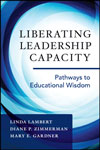 Conceptions of leadership have evolved, and Liberating Leadership Capacity captures these new ideas and provides a pathway to create sustainable systems of high leadership capacity. Available April 2016 from
Conceptions of leadership have evolved, and Liberating Leadership Capacity captures these new ideas and provides a pathway to create sustainable systems of high leadership capacity. Available April 2016 from 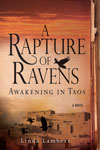 A sizzling new novel set in Taos, New Mexico. The third in the Justine Trilogy, preceded by the award-winning, The Cairo Codex and The Italian Letters. Buy it at your local independent bookstore,
A sizzling new novel set in Taos, New Mexico. The third in the Justine Trilogy, preceded by the award-winning, The Cairo Codex and The Italian Letters. Buy it at your local independent bookstore, 

